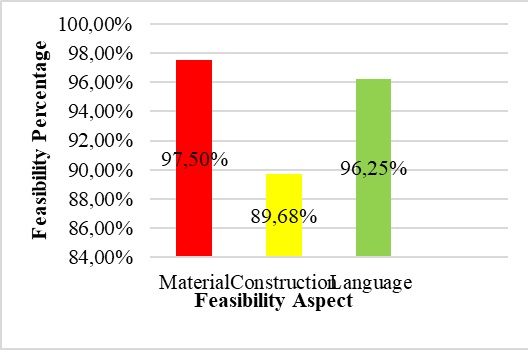
Development of Problems for Higher Order Thinking Skill (HOTS) e-Test on Additive Substance Subject Material
Abstract
Indonesia is one of the countries with low PISA (Program for International Students Assessment) achievement levels based on survey results due to the low level of higher order thinking skill of students. The causes of the low level of higher order thinking of students in Indonesia include the question given have not met the criteria of HOTS questions and the lack of ability of educations in making Higher Order Thinking Skill (HOTS) questions. This study was conducted to determine the feasibility of HOTS e-questions. The aim of developing higher-order thinking Skill (HOTS) questions in electronic form in the conditions of transition from pandemic to endemic now is so that they are easily accessible to students anywhere and at any time. The method used in this research is research and development (R&D) with ADDIE model which has 4 stages, namely: Analysis; at this stage, needs analysis and performance analysis are carried out, Design; at this stage, the process of designing or creating learning tools occurs, Development; at this stage, learning tools are developed and validated from previously selected learning sources, Implementation, and Evaluation. The form of questions that have been developed consists of multiple choice and eesay questions and scring guidelines. The overall validation results of the HOTS e-questions amounted to 94.47% with very feasible criteria. Based on the validation results, HOTS e-questions on additive are suitable for use in learning activities and are tested during science subjects at school.
Keywords
Full Text:
PDFReferences
Afrita, M., & Darussyamsu, R. (2020). Validity of High Level Thinking Test Instrument (HOTS) on Respiration System Material in Class XI SMA. Mangifera Edu, 4(2), 129-142.
Ansari, A., & Eliyati, N. (2020, March). The Development of Hots Problems on Probability and Statistics for Middle School. In Journal Of Physics: Conference Series (Vol. 1480, No. 1, P. 012031). IOP Publishing.
Arifin, Z., & Retnawati, H. (2017). Development of an Instrument to Measure Higher Order Thinking Skills in Mathematics of Grade X High School Students. Pythagoras: Journal of Mathematics Education, 12(1), 98-108.
Astuti, R. W., Hairida, H., & Rasmawan, R. Description of Critical Thinking Skills of Students on Aditive Substances in Food Class VIII SMP Negeri 11 Pontianak. Journal of Equatorial Education and Learning, 8(3).
Baharizki, S., Sabtiawan, W. B., & Widodo, W. (2021). Development of Critical Thinking Skills Assessment Instruments on Additive and Addictive Substances. Pensa: E- Journal Of Science Education, 9(3), 304-308.
Ministry of Education. (2016). Permendikbud No. 20 of 2016 Concerning Graduate Competency Standards for Primary and Secondary Education. Jakarta.
Driana, E., & Ernawati, E. (2019). Teachers' Understanding and Practices in Assessing Higher Order Thinking Skills at Primary Schools. Acitya: Journal of Teaching and Education, 1(2), 110-118.
Ekawati, Y., Nuriyatin, S., & Ayuningtyas, N. (2021). Critical Thinking Ability in Solving High Order Thinking Skills (HOTS) Problems on Number Material. Journal Of Education: Study Of Educational Science, 7(1), 105-110.
Fanani, Moh. Zainal. (2018). Strategies for Developing Higher Order Thinking Skill (HOTS) Questions in the 2013 Curriculum. Edudeena Journal, 2 (1).
Hidayati, Nyemas, Rasmawan, R., Ulfah, M. (2022). Description of Chemistry Teacher Candidates' Ability in Making Higher Order Thinking Skill (HOTS) Questions. Journal of Education Science (Educative), 4 (3).
Ichsan, I. Z. (2019). ILMIZI: Innovation Learning Model for Natural Science and Environmental Learning Based on HOTS. International Journal for Educational and Vocational Studies, 1(6), 578-584.
Ministry of Education and Culture (2017). Literacy in Learning (Online).
Murni, V., Kurniawan, J., & Jehadus, E. (2020, April). How to Develop Higher-Order Thinking Skills. In Journal of Physics: Conference Series (Vol. 1521, No. 3, p. 032012). IOP Publishing.
Purbaningrum, K. A. (2017). Junior High School Students' Higher Level Thinking Ability in Mathematics Problem Solving in View of Learning Style. Journal of Mathematics Research and Learning, 10(2), 40-49.
Retnawati, H., Djidu, H., Kartianom, Apino, E., & Anazifa, R. D. (2018). Teachers' Knowledge About Higher- Order Thinking Skills and Its Learning Strategy. Problems of Education in the 21st Century, 76(2), 215- 230.
Saleha, T. R., Muharini, R., & Hadi, L. (2020). Development of Higher Order Thinking Skills (HOTS) Assessment Instruments on Additive Substances. Journal of Education and Learning Equator, 9(1).
Saputra, H. (2016). Development of Education Quality Towards the Global Era: Strengthening The Quality of Learning with the Application of HOTS (High Order Thinking Skills). Smile's.
Sugiyono. (2015). Combination Research Methods (Mix Method). Bandung: Alfabeta.
Sugiyono. (2016). Educational Research Methods Quantitative, Qualitative, and R&D Approaches. Bandung: Alfabeta.
Wahyuningtyas, N., & Ratnawati, N. (2018). Higher Order Thinking Skill (HOTS) Question Development Workshop For Mgmp Ips Teachers In Malang District Training. Preparation. Journal of Social Praxis and Dedication (JPDS), 73-79.
Walizer, M., Wiener, P. L., & Sadiman, A. (1987). Research Methods and Analysis: Searching for Relationships Volume 2.
Wicaksono, A. G., & Jumanto, J. (2019). Development of Higher Order Thinking Skills (HOTS) Questions for Elementary School Teachers. Adi Widya: Journal of Community Service, 3(2), 14-20.
Widhiyani, I. A. N. T., Sukajaya, I. N., & Suweken, G. (2019). Development of Higher Order Thinking Skill (HOTS) Questions for Categorizing Geometry Problem Solving Ability of Junior High School Students. Indonesian Journal of Mathematics Education and Learning, 8 (2), 68-77.
Widarto. (2014). Developing Learning Outcome Assessment Instruments is an Important Competency for Professional Teachers. National Seminar Paper. Yogyakarta: Institute for Research and Community Service (LPPM) State University of Yogyakarta.
Winarti, Hairida, & Lestari, I. (2021). Description of Teachers' Ability to Make Questions Based on the 2013 Curriculum in Senior High Schools in Landak Regency. Scientific Journal of Wahana Pendidikan, 7 (2).
Yani, J. A., & Sugiyono. (2017). Quantitative, Qualitative, and R&D Research Methods. Bandung; Alfa
Ferrari, JR, Jhonson, JL, & McCown, WG (1995). Procrastination and Task Avoidance: Theory, Research &Treatment. New York: Plenum Press. Yudistira P, Chandra. Diktat Kuliah Psikometri. Fakultas Psikologi Universitas.
DOI: https://doi.org/10.33394/hjkk.v11i5.8730
Refbacks
- There are currently no refbacks.

This work is licensed under a Creative Commons Attribution-ShareAlike 4.0 International License.





